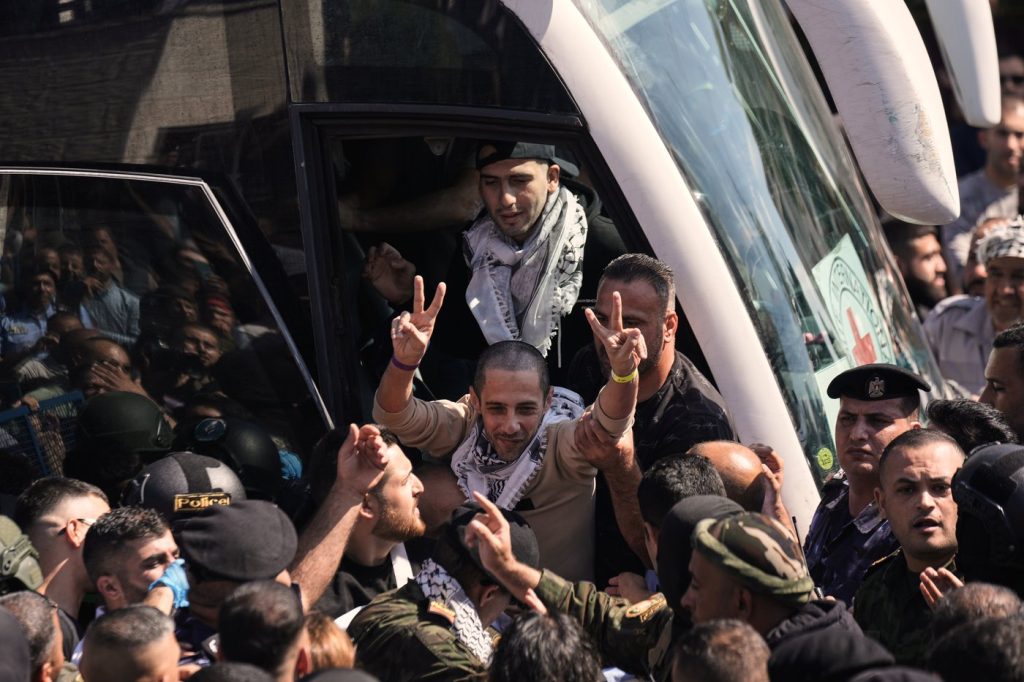Israel and Hamas have taken significant steps toward implementing a ceasefire agreement that was brokered by the United States, which aims to bring an end to the ongoing conflict in Gaza. On Monday, the two parties proceeded with the release of hostages and prisoners, generating cautious optimism about the potential for a long-term resolution to the two-year war that has devastated the Palestinian territory.
However, critical issues remain unresolved, such as whether Hamas will disarm and who will take control of Gaza in the future. Furthermore, the broader question of Palestinian statehood complicates the fragile ceasefire, which, for now, serves only as a temporary halt to what is considered the most lethal conflict in the history of Israel and the Palestinians.
The release of the 20 remaining living hostages elicited joy in Israel, as many families felt a sense of closure amidst a war attributed largely to Hamas's actions. Despite this relief, there remains a strong commitment to recovering the bodies of deceased hostages still held in Gaza. With living hostages now returned, the urgency to call for the end of hostilities may diminish, potentially reducing pressure on Israeli Prime Minister Benjamin Netanyahu to progress on subsequent phases of the ceasefire agreement.
In addition to the living hostages, four deceased ones were returned to Israel, with another 24 expected to be handed over as part of the first phase of the ceasefire. This phase also requires Israel to facilitate a substantial influx of humanitarian aid into Gaza, which is in dire need after extensive destruction from Israeli bombings that have disrupted basic services and economic stability.
Israel Claims Objectives Achieved Through the Deal
U.S. President Donald Trump visited the region to express support for the ceasefire deal. In his address to the Israeli parliament, he encouraged lawmakers to seize the moment for a broader peace initiative in the Middle East. Netanyahu, who did not attend a crucial meeting in Egypt due to a Jewish holiday, affirmed his commitment to the agreement, asserting that it fulfilled all of Israel’s objectives in the conflict. He asserted, prior to the agreement, that Israel would not end the war until all hostages were released and Hamas was effectively defeated. Critics have accused Netanyahu of prolonging the conflict for political gain, a claim he has refuted.
The conflict erupted on October 7, 2023, following a deadly attack by Hamas that resulted in the deaths of 1,200 individuals, and the capture of 251 hostages. Israel's subsequent military response has resulted in more than 67,000 casualties in Gaza, according to the territory's Health Ministry. These figures, presented by a ministry affiliated with the Hamas-run government, are regarded as reliable estimates by the United Nations and various independent experts.
The repercussions of the war have extended throughout the Middle East, igniting additional conflicts involving Israel and Hezbollah, Iranian-backed factions in Yemen, and Iran itself.
Israel Celebrates the Return of Living Hostages
Public screenings across Israel drew thousands of attendees celebrating the return of the 20 living hostages, all men, as they were reunited with their families. Emotional scenes unfolded, with tears of joy and cheers erupting as families embraced their loved ones. Personal stories shared during these reunions underscored the anxiety and longing experienced during their absence. Hamas, unlike in previous releases, did not hold ceremonies for the hostages’ return, opting instead to facilitate video calls, giving families their first glimpse of their loved ones before their arrival home.
Throughout the conflict, public support for the hostages remained strong in Israel, prompting weekly mass protests advocating for their release. The issue of hostages has become a central motivator for many Israelis calling for an end to the war, with public sentiment increasingly proposing that Israel's dual objectives of freeing hostages and defeating Hamas are fundamentally at odds.
Israeli Defense Minister Israel Katz stated that any delay by Hamas in returning the bodies of the deceased hostages would be perceived as a breach of the ceasefire deal.
Israel Frees Approximately 1,900 Palestinian Prisoners
In tandem with the release of hostages, Israel freed around 1,900 Palestinian prisoners, greeted by jubilant crowds in various locations including Beitunia in the West Bank and Khan Younis in Gaza. These released individuals displayed V-for-victory signs as they exited the buses that transported them to their respective homes or regions. The prisoners' release includes those serving life sentences for their involvement in attacks against Israelis, alongside many others held without charges during the conflict.
The issue of Palestinian prisoners remains profoundly sensitive in Palestinian society, where many individuals have connections to those imprisoned by Israel. These prisoners are often viewed as freedom fighters and bear significant emotional weight within the community.
Trump's Optimism Amidst Remaining Challenges
While Trump expressed excitement about the potential for peace during his address to the Knesset, significant challenges persist. Among the most contentious issues is Israel's demand for a disarmed Hamas, which the group firmly rejects. Hamas insists that Israel withdraws its troops from Gaza entirely.
Israeli military forces have begun to withdraw from much of Gaza City and Khan Younis while maintaining a presence in key areas such as Rafah and other northern towns. The governance of Gaza remains uncertain, with proposals from the U.S. suggesting an international body to oversee the territory, involving Palestinian technocrats in daily administration. Conversely, Hamas advocates for a governance model developed through consensus among Palestinian factions.
Netanyahu's opposition to plans that reintroduce the Palestinian Authority into the governance framework complicates matters further, even as the U.S. envisions a role for Abbas's authority with necessary reforms. There is also the proposition for an Arab-led international security force to assist in maintaining order, alongside a potential avenue for a future Palestinian state, which remains a contentious topic for Netanyahu.












